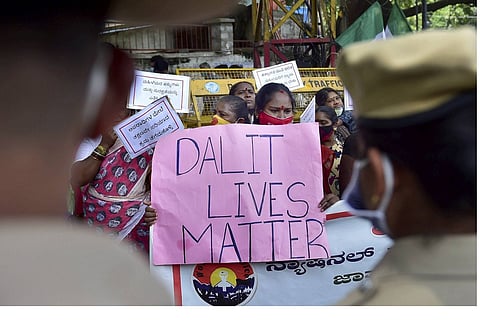

The National Eligibility cum Entrance Exam (NEET), the Goods and Services Tax and several other policies in the last few years have affected Dalits and Adivasis in India in a big manner. Now, ahead of the Assembly elections in four states and one Union Territory, a manifesto has been released by two Dalit groups, making clear demands for justice and welfare for Dalit and Adivasi people. Dalit Collective of Justice, Tamil Nadu, and National Dalit Movement for Justice have together launched a combined manifesto for Dalits and Adivasi people including children.
As per the 2011 census, around 44.8% of Scheduled Tribe and 33.8% of Scheduled Caste population in rural areas is below the poverty line in India, the manifesto points out. As a result, many of them are deprived of their basic needs, and are left without any employment opportunities. This forms a big part of the manifesto, which focuses on social justice schemes, law and order issues, and makes demands from the Union government as well.
Here are some highlights from the manifesto:
The manifesto strongly speaks out against the discrimination faced by Dalit and Adivasi children in schools. The discrimination has led many children to quit their schooling and to stop this, the syllabus should be drafted in a way that promotes inclusiveness, the manifesto says. Other demands around social justice in the manifesto include:
> To implement the quota system in the appointment of judges to High Courts and Supreme Courts.
> To provide financial aid for Dalit and Adivasi children who take up higher studies.
> To take speedy action on cases of discrimination against Dalit leaders under Prevention of Scheduled Caste and Scheduled Tribe (Prevention of Atrocities) Act, 1989.
> To ensure safety of children from sexual abuse and protection from child marriage.
> To ensure sanitation, shelter and food for Dalit families below the poverty line.
Dalit and Tribal people have for long been fighting to retain the panchami lands allotted to them. Highlighting the encroachment on panchami lands, the manifesto demans that the government retrieve the lands with temples and forest departments, and allot them to the Dalit population. It also demands that the government remove the encroachment of government lands by people in power.
The manifesto urges the government to give patta to the land owned by Dalits and Adivasis, and start an initiative to get back the encroached panchami lands.
The manifesto explains the difficulties faced by the people living in huts and the way they are forced to spend all their earnings on renovating their huts in case there is a natural calamity. The manifesto asks for a scheme to construct tenements for rehabilitation and to make Tamil Nadu as a state without huts.
While social justice schemes are important to uplift the deprived, the manifesto also focuses on caste atrocities during the lockdown, and the need to implement pre-existing laws. The manifesto wants the governments to:
> To completely implement Prevention of Scheduled Caste and Scheduled Tribe (Prevention of Atrocities) Act, 1989.
> Judges to appoint special lawyers to handle cases pertaining to caste atrocities so that the lawyers are equipped to give the required attention the case.
> To bring Dalit and Tribal Christians and Muslims under the preview of Prevention of Scheduled Caste and Scheduled Tribe (Prevention of Atrocities) Act, 1989.
The organisations have mainly demanded the Union government to revoke several central government policies in the country and importantly move education, which is currently under the Concurrent list, to the State list.
> The Union government should follow the State and Concurrent lists of the Constitution and allow the state to exercise their autonomous functions.
> The Union government should give the state’s share of GST dues.
> Education should completely be brought under the State list. The state government should ensure that the native languages and mother-tongue of the children in the state are mandatorily taught.
> National Eligibility Cum Entrance Exam (NEET) should be abolished.
> National Education Policy should not be implemented.
> Citizenship Amendment Act (CAA) should be revoked.
> Farm Laws should be rescinded.
> National Environmental Policy must be cancelled.